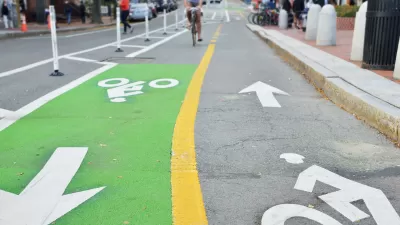As managing editor of Planetizen, I'd like to make a quick note on today's op-ed, Resisting Dickensian Gloom by Tony Recsei. Mr Recsei asked for a chance to respond to a recent criticism of his work by Planetizen regular Michael Dudley. It is our policy at Planetizen to allow points of view that are critical of the status quo in urban planning, so I agreed to run the piece. I did ask Mr. Recsei to tone down some of the more personal attacks on smart growthers so that his points could be presented more clearly to our audience, and I believe he has done that.
As managing editor of Planetizen, I'd like to make a quick note on today's op-ed, Resisting Dickensian Gloom by Tony Recsei. Mr Recsei asked for a chance to respond to a recent criticism of his work by Planetizen regular Michael Dudley. It is our policy at Planetizen to allow points of view that are critical of the status quo in urban planning, so I agreed to run the piece. I did ask Mr. Recsei to tone down some of the more personal attacks on smart growthers so that his points could be presented more clearly to our audience, and I believe he has done that.
I did do one bit of fact-checking, because I was interested in the work of the Australian Conservation Foundation, which Mr. Recsei cites. His interpretation is that inner-city residents of Australian cities create more greenhouse gas emissions than those who live in suburban areas. I asked Charles Berger, Director of Strategic Ideas at the ACF, if that was the case. Here is his response:
The findings are quite challenging for some environmentalists. In particular, they suggest that merely increasing urban densities and using public transport will not necessarily reduce total or per-capita ecological footprints. In Australia, wealthy inner city residents are driving less than others, but have increased consumption in nearly every other category of goods and services. Whatever savings are being achieved by bicycling and walking are being more than counterbalanced by increased airplane flights, food, clothing, and much else besides.
We are aware that some commentators have used these findings to encourage unsustainable peri-urban developments, and we categorically reject their conclusions. Eco-footprints in suburban areas in Australia are lower than in the urban core in spite of, not because of, lower residential densities. What the pro-urban sprawl groups also miss is that fact that Australian ecological footprints are across the board far higher than any reasonably sustainable level. Neither inner urban nor outer suburban development patterns are currently anything like sustainable.
Neither consumption-intensive inner city lifestyles, nor vehicle-dependent suburban lifestyles, are compatible with ecological imperatives. The main finding of our Consumption Atlas is that both need to change, and change dramatically.
Regards
Chuck Berger

Planetizen Federal Action Tracker
A weekly monitor of how Trump’s orders and actions are impacting planners and planning in America.

Map: Where Senate Republicans Want to Sell Your Public Lands
For public land advocates, the Senate Republicans’ proposal to sell millions of acres of public land in the West is “the biggest fight of their careers.”

Restaurant Patios Were a Pandemic Win — Why Were They so Hard to Keep?
Social distancing requirements and changes in travel patterns prompted cities to pilot new uses for street and sidewalk space. Then it got complicated.

Platform Pilsner: Vancouver Transit Agency Releases... a Beer?
TransLink will receive a portion of every sale of the four-pack.

Toronto Weighs Cheaper Transit, Parking Hikes for Major Events
Special event rates would take effect during large festivals, sports games and concerts to ‘discourage driving, manage congestion and free up space for transit.”

Berlin to Consider Car-Free Zone Larger Than Manhattan
The area bound by the 22-mile Ringbahn would still allow 12 uses of a private automobile per year per person, and several other exemptions.
Urban Design for Planners 1: Software Tools
This six-course series explores essential urban design concepts using open source software and equips planners with the tools they need to participate fully in the urban design process.
Planning for Universal Design
Learn the tools for implementing Universal Design in planning regulations.
Heyer Gruel & Associates PA
JM Goldson LLC
Custer County Colorado
City of Camden Redevelopment Agency
City of Astoria
Transportation Research & Education Center (TREC) at Portland State University
Camden Redevelopment Agency
City of Claremont
Municipality of Princeton (NJ)






























